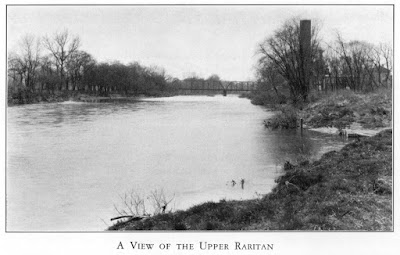Anna Case silently opened the vestry door - just a crack - enough to peer out from what served as the backstage area at the Somerville Second Reformed Church and look at the townsfolk filing into the pews. The date was October 11, 1912 - nearly three years since her November 1909 debut with New York's Metropolitan Opera.
 |
| 3 November 1912 Pittsburgh Press |
She had been singing in churches for most of her life - first in the choir of the South Branch Reformed Church where she grew up, then playing the organ and leading the choir at the Neshanic Reformed Church. Her first regular professional engagement as a singer was as a soloist at the First Presbyterian Church of Plainfield. Lately, she had been supplementing her Metropolitan salary by singing the soprano part in the quartet at Brooklyn's Church of the Pilgrims.Yet still, she was nervous, and understandably so. For on this Friday night her father would hear her sing professionally for the first time.
 |
| Somerville's Second Reformed Church, postcard circa 1915 |
When Anna Case signed her first contract with the Metropolitan in 1909, the national newspapers made much of the fact that her father, Peter Case, was the village blacksmith in South Branch, and that young Anna had spent her youth shooing flies - and occasionally shoeing horses - around his shop. She spoke openly about having just one dress and one pair of shoes per year - and the endless chores that came from a life lived in rural near-poverty. This was decidedly not the typical upbringing of a future prima donna.
 |
| 3 November 1912 Pittsburgh Press |
In later years when Anna Case spoke about her childhood, she half-jokingly said that her family was so poor that her parents couldn't even afford to give her any affection. She described her father as a very religious man who disdained her desire for anything other than doing chores and taking care of the family - a sickly mother and two much younger siblings. Beatings were common.
Peter Case forbade his daughter from becoming a singer - equating the stage - even grand opera - with temptation and sin. She borrowed money for lessons from the South Branch grocer, found her own teacher, and then a better one, and left home when she got that job in Plainfield. Twenty-seven dollars a month, of which twenty-four went for rent at a boarding house. She spent most weekdays keeping to the bed in her room, explaining later that you don't feel so hungry when you're just lying still.
 |
| 1912 studio portrait |
As the concert-goers took their seats, she smiled to herself. There were the grocer and his wife, her old music teacher, the boys and girls she had taught in the choir, and finally, right near the front, in a pew reserved just for them, her two little brothers, her be-gowned mother, and her father - dressed in his Sunday best and beaming with pride.
Thunderous applause greeted Mlle. Case when she appeared after the opening act harpist had finished. She began with the arias she had been singing for years, but finished with the old songs best loved by the home folks - completing her set with "Home Sweet Home". Friends and admirers rushed to the front of the stage.
Bouquets of flowers were showered on the hometown girl amid cheers and applause. Peter Case pushed his way powerfully to the front with his arms outstretched. Anna took one step forward and fell into his arms, "Oh. dad!" she cried, as they hugged each other for perhaps the first time. All forgotten, all forgiven.
















